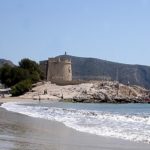Nestled on the Costa Blanca in the province of Alicante, Spain, Moraira is a picturesque coastal town that boasts a rich tapestry of flavors, deeply rooted in its agricultural heritage and Mediterranean climate. Among its most cherished contributions to Spanish cuisine are its olive oil and a variety of other local products, each telling a story of tradition, quality, and a deep connection to the land. This article delves into the flavors of Moraira, focusing on its olive oil and exploring the other local delicacies that make this town a culinary treasure.
The Crown Jewel: Moraira's Olive Oil
Olive oil, often referred to as "liquid gold," is a cornerstone of Mediterranean cuisine and a vital part of Moraira's agricultural output. The region's climate, characterized by mild winters and hot summers, coupled with its fertile soil, provides the perfect conditions for olive cultivation. The local olive groves, some of which are centuries old, produce a variety of olives that are then pressed to create oils of exceptional quality and flavor.
Varieties and Characteristics
The most prominent olive varieties in Moraira include the Blanqueta, Manzanilla, and Picual, each contributing unique flavors and properties to the oil. Blanqueta olives yield a delicate, slightly fruity oil, perfect for dressing salads or as a finishing touch on dishes. Manzanilla oils are appreciated for their balanced bitterness and spice, making them versatile in cooking. Picual, known for its robust flavor and higher antioxidant content, is ideal for frying and hearty dishes.
Local producers employ both traditional and modern methods to extract the oil, ensuring that the olives' natural flavors and health benefits are preserved. Cold pressing is a preferred technique, where olives are pressed without heat or chemicals, resulting in extra virgin olive oil of the highest quality.
Culinary Uses and Health Benefits
Moraira's olive oil is a staple in local kitchens, used not only for its flavor but also for its health benefits. Rich in monounsaturated fats, antioxidants, and anti-inflammatory compounds, it's a key ingredient in the Mediterranean diet, associated with longevity and a reduced risk of chronic diseases.
In Moraira, olive oil is more than just a cooking ingredient; it's a cultural icon, drizzled over freshly grilled fish, mixed into aioli, or simply served with bread as a testament to its unparalleled quality.
Beyond Olive Oil: Moraira's Culinary Treasures
While olive oil may be the star, Moraira's gastronomic landscape is dotted with other local products that embody the region's agricultural diversity and culinary heritage.
Fruits and Nuts
The fertile lands around Moraira are abundant with citrus groves, almond trees, and vineyards. Oranges, lemons, and limes, bursting with juice and flavor, are essential to many local dishes and desserts. Almonds, harvested in late summer, find their way into sweets like the traditional turrón or are savored roasted with a pinch of salt. The local vineyards produce wines that perfectly complement the region's cuisine, from light, refreshing whites to robust reds.
Seafood and Fish
Given its coastal location, Moraira boasts a rich variety of seafood and fish, integral to its culinary identity. Daily catches bring in sardines, dorada (sea bream), and red shrimp, a local delicacy known for its sweet, delicate flavor. These are often prepared simply, grilled with a sprinkle of sea salt and a generous drizzle of local olive oil, allowing the quality of the ingredients to shine.
Cheeses and Charcuterie
The hinterlands of Moraira are home to small-scale producers of goat and sheep cheeses, offering a range of flavors from mild to sharp, often infused with herbs or wrapped in grape leaves. Alongside these, the local charcuterie, including sobrasada (a soft, spreadable chorizo) and cured hams, provides a taste of the region's pastoral traditions.
Citrus Fruits
The orchards of Moraira are awash with the vibrant hues of citrus fruits. Oranges, lemons, and limes thrive in the region's sunny climate, offering a burst of freshness and acidity that enhances both savory dishes and desserts. These fruits are not only consumed fresh but also used to produce marmalades, liqueurs, and vinegars.
Almonds
Almond trees, with their delicate pink blossoms, are a common sight in the countryside around Moraira. The nuts are harvested in late summer and feature prominently in local cuisine. From the sweet, nougat-like turrón to savory dishes and almond-based sauces, these nuts add a rich flavor and crunch to a variety of dishes.
Honey
The diverse flora of the region provides an excellent environment for beekeeping. Moraira's honey, with its complex flavors, reflects the variety of flowers from which the bees collect nectar. This golden elixir is used in cooking, baking, and as a natural sweetener in drinks.
Vegetables and Legumes
The fertile valleys and terraces around Moraira yield a variety of vegetables and legumes, integral to the local diet. Tomatoes, peppers, artichokes, and beans are just a few examples, used in traditional dishes like cocido and escalivada.
Saffron
Although not as widely recognized as some of Spain's other regions, the area around Moraira does produce saffron, the world's most expensive spice by weight. This precious product is used sparingly in dishes such as paella to add color and a distinctive flavor.
These local products, along with olive oil, form the backbone of Moraira's culinary heritage, reflecting the region's history, culture, and geographical diversity. Together, they offer a palette of flavors that is distinctly Mediterranean, inviting locals and visitors alike to explore and savor.
Sustainable Practices and Agritourism
In recent years, there has been a growing emphasis on sustainable agriculture and tourism in Moraira. Local producers are increasingly adopting organic farming methods, reducing water use, and preserving biodiversity. This commitment to sustainability not only ensures the long-term viability of the agricultural sector but also enhances the quality of the products.
Agritourism has become a significant aspect of Moraira's appeal, with many olive oil producers and wineries opening their doors to visitors. Tours offer a glimpse into the production processes, from the olive groves and vineyards to the pressing and fermentation facilities, culminating in tastings that highlight the depth and complexity of the local flavors.
Conclusion
Moraira, with its olive oil and array of local products, stands as a testament to the Mediterranean's rich culinary heritage. The town's commitment to quality, tradition, and sustainability ensures that its flavors remain vibrant and cherished, both locally and beyond. Whether it's through the silky smoothness of its olive oil, the zest of its citrus, or the freshness of its seafood, Moraira offers a gastronomic journey that is as delightful as it is profound. As visitors and locals alike explore its culinary landscape, they are reminded of the simple joy of eating well, in harmony with the land and its seasons.
Frequently Asked Questions (FAQs)
What makes Moraira's olive oil unique?
Moraira's olive oil is distinguished by its varieties like Blanqueta, Manzanilla, and Picual, each offering unique flavors due to the region's ideal climate and traditional pressing methods.
Can visitors experience olive oil production in Moraira?
Yes, visitors can tour local olive groves and presses, experiencing the production process firsthand and enjoying tastings that showcase the oil's quality and flavor
What other local products can be found in Moraira?
Besides olive oil, Moraira boasts a range of local products including citrus fruits, almonds, wine, fresh seafood and fish, as well as artisan cheeses and charcuterie
How does Moraira contribute to sustainable agriculture?
Moraira's producers are increasingly adopting sustainable practices such as organic farming, water conservation, and biodiversity preservation, enhancing both the environment and product quality
What are the health benefits of Moraira's olive oil?
Rich in monounsaturated fats, antioxidants, and anti-inflammatory properties, Moraira's olive oil is a key component of the Mediterranean diet, linked to longevity and reduced risk of chronic diseases





